Los

|
Note: This is a user's personal page attached to their profile! This is not an actual article, may not be related to JoJo or Araki, and is not associated with the wiki. As such, it may not adhere to the policies. |
Los (運命, Unmei) to koncepcja z góry określonego biegu wydarzeń, zwłaszcza takiego, który służy większemu celowi. W serii JoJo's Bizarre Adventure los jest traktowany jako fakt i ma ogromny wpływ na całą historię.
Podsumowanie
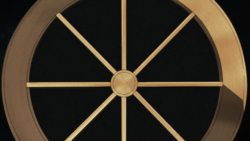
Los zostaje wprowadzony już w pierwszym rozdziale serii jako nadrzędna siła stojąca za wszystkimi rzeczami, a jego wpływ jest przywoływany w całej historii. Dokładna natura i wola losu nigdy nie zostaje zdefiniowana; niemniej jednak pod koniec Stone Ocean rozumie się, że jest to siła, która ostatecznie sprzyja sprawiedliwości, nawet jeśli w niektórych momentach wydaje się inaczej.[1] Konflikt między przeznaczeniem a ludzką wolą jest głównym tematem całej serii, najbardziej widocznym w Diamond is Unbreakable, Vento Aureo i Stone Ocean.
Istnienie losu jest namacalnie demonstrowane kilka razy w całej serii. Rolling Stones bezpośrednio czerpie swoją energię bezpośrednio z mocy losu, a ostateczny cel Made in Heaven opiera się na istnieniu i bezruchu losu. Mówi się również, że Cinderella wykorzystuje swoją moc, aby bezpośrednio wpływać na los. Inne Standy, takie jak Thot i King Crimson, a także niektóre utalentowane osoby, takie jak Tonpetty, są w stanie przewidzieć wydarzenia, które będą miały miejsce w najbliższej przyszłości z pewnością, ale z zastrzeżeniem, że wspomniane wydarzenia nie mogą być w żaden sposób zmienione, a jedynie źle zrozumiane. Nawet w przypadku King Crimson, wydarzenia mogą być całkowicie usunięte tylko poprzez wymazanie okresu czasu, w którym mają miejsce. Jednak te i inne moce, które "zmieniają los", są również z góry uwzględnione przez los i jako takie tylko przyczyniają się do jego celów.[2]
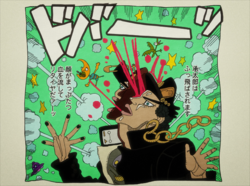
Chociaż szerszy kształt przeznaczenia ogólnie pozostaje nieznany, w opowieści można zidentyfikować pewne wzorce. Najważniejszym przykładem tych wzorców jest idea "grawitacji" między niektórymi ludźmi, którzy są sobie przeznaczeni. Według Toshikazu Hazamady, taka siła działa na wszystkich użytkowników Standów, prowadząc ich do spotkania jako przyjaciół lub wrogów.[3] Enrico Pucci poświęca się tej idei, wykorzystując ją do uzasadnienia różnych zjawisk, które pomagają mu w realizacji jego celów.[4] Ostatecznie, choć dosłowna siła grawitacji jest tym, co pozwala Pucciemu ukończyć jego zdolność Standa,[5] Emporio Alnino powołuje się na tę samą grawitację, wyjaśniając porażkę księdza.[1]
Ludzie są również w stanie wykorzystywać wzorce w losie, aby odgadnąć jego rozwiązania; przykłady tego sięgają od przepowiedni, takich jak ta z Czerwonego Kamienia Aja[6] po wróżby wykonywane między innymi przez Wang Chana i Muhammada Avdola. Osoby takie jak Yoshikage Kira i Diavolo mogą również rozwinąć ideę, że są faworyzowane przez los, choć nie ma gwarancji, że takie przekonania są dokładne.
Powiązane zjawiska
Feng Shui
- Główny artykuł: Dragon's Dream
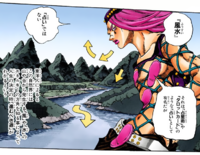
Feng Shui (風水, Fūsui, dosł. Wiatr i Woda), zwane także
Kenzou przeżył masowe samobójstwo swojego kultu, nieświadomie stojąc w szczęśliwym miejscu, które było chronione przed gruzami zawalającego się budynku, w którym się znajdował. Po trafieniu do więzienia, Kenzou wykorzystał moc feng shui do przeprowadzania zabójstw, wykorzystując szczęśliwe i pechowe obszary ludzkiego ciała, aby celować w ich słabe punkty, jednocześnie chroniąc się przed atakiem.[7] Technika Kenzou ostatecznie zamanifestowała się jako Dragon's Dream, którego forma zawiera zarówno strzałkę wskazującą pechowe kierunki, jak i kompas wskazujący szczęśliwe kierunki; pozwala to Kenzou określić najlepszy sposób ataku na pierwszy rzut oka, ale także dostarcza tych samych informacji swoim przeciwnikom.[8]
Szczęście
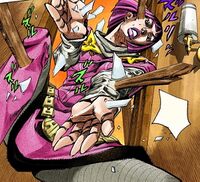
- Główny artykuł: Saint's Corpse
Happiness (幸福, Kōfuku) is a concept in Steel Ball Run that serves as the basis of the Saint's Corpse's power. Within the world, there is a balance of fortune and misfortune such that the two level out overall. The Saint's Corpse, when fully assembled, is able to manipulate that fortune by repelling misfortune from itself and its owner, leaving only good fortune and a state of "happiness" around both.[9] The only known exception to this principle is the law of gravity; as such, it can be overcome by gravity such as that created by two of the same person from parallel worlds existing in the same world,[10] or bypassed entirely by beings of infinite energy like Ball Breaker and Tusk ACT4.[11][12]
Upon awakening the corpse's power, Funny Valentine also gains the ability D4C Love Train, which creates a seam of light that Valentine can traverse and manipulate freely. However, Love Train is as much an evolution of his own Stand as it is an ability bestowed by the corpse; as such, the successor to the corpse's power (namely Parallel World Diego) does not gain a similar ability.[13]
Przepływ
- Główny artykuł: Wonder of U
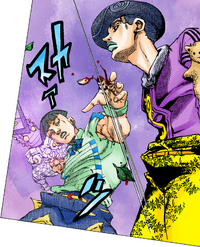
Flow (流れ, Nagare) is a concept in JoJolion proposed by Norisuke Higashikata IV. Norisuke believes that there is a "flow" or natural path for everything in life, even a simple fruit parlor, and that determining and accepting it is sure to lead one to their goal. This idea is later expanded by a natural law called Calamity (厄災, Yakusai), which functions as the basis behind Wonder of U, Toru's Stand.[14]
Calamity is an unavoidable negative energy that causes unfortunate events to occur as part of flows. In its natural state, it affects people at random, regardless of morality or circumstance, and regardless of whether they've made any mistakes or accepted the flows of things.[15] The law of calamity can manifest grievous misfortunes via any means necessary. For instance, calamity causes rain drops to pierce Josuke Higashikata, giving him near-lethal wounds,[16] and a falling leaf to slice off Joshu Higashikata's fingers.[17] Calamity can also manifest as an unfortunate chain of events: according to Mitsuba Higashikata, Yasuho Hirose's discovery of the New Locacaca fruit and Norisuke subsequently being incapacitated is also a part of the ongoing calamity targeting her and her family.[18]
To those who can see Stands, calamity is accompanied by a vision of Toru's Stand, Wonder of U, even after Toru's demise. The only known forces capable of averting an occurrence of calamity are those that transcend the flow of logic itself, such as the Spin as applied by Soft & Wet: Go Beyond.[19]
Mechanizmy
Mechanisms (
Tworzenie i rozwój
Although he does not believe in God, Hirohiko Araki himself harbors a belief in some kind of overarching force, including the concept of fate. By extension, Araki believes that tackling subjects such as fate in his works, through proxies such as bloodlines, is what gives them meaning;[21] Araki thinks similarly of other works as well, praising works from The Book to Spider-Man for addressing the presence of destiny.[22][23] Nonetheless, he considers such factors to be an inevitability in the realm of manga, being determined by the circumstances of the work.[24]
However, Araki also believes that being unable to escape one's fate is more terrifying than death itself.[25] As such, he greatly admires and aims to write characters who move forward without consideration for fate, indirectly confronting and surpassing it in the process.[26][27] To Araki, the ability to move forward and carve out one's own fate is the greatness of humanity that he aims to celebrate in his manga.[28][29]
Przypisy
- ↑ 1.0 1.1 Stone Ocean Chapter 158: What a Wonderful World
- ↑ Stone Ocean Chapter 157: Made in Heaven, Part 9
- ↑ Chapter 294: Yukako Yamagishi Falls in Love, Part 1
- ↑ Stone Ocean Chapter 136: Heavy Weather, Part 12
- ↑ Stone Ocean Chapter 148: C-MOON, Part 8
- ↑ Chapter 76: Ripple Teacher Lisa Lisa, Part 6
- ↑ 7.0 7.1 Stone Ocean Chapter 67: Enter the Dragon's Dream, Part 1
- ↑ Stone Ocean Chapter 68: Enter the Dragon's Dream, Part 2
- ↑ Steel Ball Run Chapter 88: Break My Heart, Break Your Heart, Part 1
- ↑ Steel Ball Run Chapter 95: The World of Stars and Stripes - Outro
- ↑ Steel Ball Run Chapter 83: Ball Breaker, Part 1
- ↑ Steel Ball Run Chapter 86: Ball Breaker, Part 4
- ↑ Steel Ball Run Chapter 78: D4C, Part 11 -Love Train-
- ↑ JoJolion Chapter 99: The Wonder of You, Part 16
- ↑ JoJolion Chapter 98: The Wonder of You, Part 15
- ↑ JoJolion Chapter 90: The Wonder of You, Part 7
- ↑ JoJolion Chapter 104: The Wonder of You, Part 21
- ↑ JoJolion Chapter 95: The Wonder of You, Part 12
- ↑ JoJolion Chapter 108: Go Beyond, Part 2 Tailpiece
- ↑ The JOJOLands Chapter 1: Departure
- ↑ Interview:THRILL (September 2001)
- ↑ Interview:Araki x Otsuichi - The Book (December 2007)
- ↑ Interview:Playboy (July 2004)
- ↑ Interview:Monsoon Vol. 2 (March_1999)
- ↑ Interview:Quick Japan (December 2007)
- ↑ Interview:Vento Aureo Paperback Vol. 10 (August 2005)
- ↑ Interview:XxxHolic Guidebook (November 2006)
- ↑ Interview:Da Vinci (August 2005)
- ↑ Interview:Anime News Network (June 2017)
Nawigacja w witrynie


